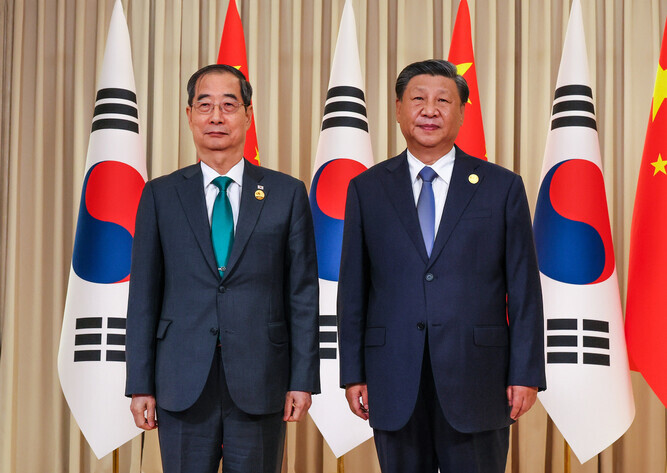hankyoreh
Links to other country sites 다른 나라 사이트 링크
Xi’s hint at S. Korea visit may be aimed at checking Seoul’s cozy ties with US, Japan

Beijing appears to be making considerations for Seoul, even hinting at a visit to South Korea by President Xi Jinping. The gesture comes after China had previously taken a hard-line stance with Korea, going so far as to inform it of its “Four Noes” policy in May that put forth lines that, if crossed, would throttle relations between the two.
The move is being interpreted as Beijing’s attempt at managing South Korea-China relations to prevent Seoul from leaning further on its ties with Washington and Tokyo.
During a meeting with South Korean Prime Minister Han Duck-soo on the sidelines of the Hangzhou Asian Games on Saturday, Xi reportedly said he would “seriously consider” a visit to South Korea, a subject which has been up in the air since 2014, and pledging China’s support for Busan to host the 2030 World Expo.
The Chinese president expressed hopes that a trilateral summit with South Korea and Japan, something which Seoul has actively pushed for, could take place “at an appropriate time.”
The tone is a far cry from Xi’s noncommittal response when he met with South Korean President Yoon Suk-yeol at the Group of 20 summit in Bali, Indonesia, in November 2022.
Relations between the two countries further deteriorated after Yoon made comments in an interview with Reuters ahead of his state visit to the US in late April that seemed to dismiss the “one China” principle that underpins China-South Korea relations, such as comparing cross-Strait relations to the issue of North and South Korea.
In response, China dispatched a senior official from its Ministry of Foreign Affairs to deliver a “Four Noes” policy to Seoul, stating that bilateral cooperation would be impossible if South Korea touches China’s “core interests” and moves toward a pro-US, pro-Japan, unilateral foreign policy. It was also made clear a visit to South Korea by Xi would prove difficult under the current circumstances.
China’s policy shift comes after the leaders of South Korea, the United States and Japan decided to strengthen military cooperation among their countries at a summit held at Camp David in August.
The shift in policy seems to stem from a realization that it is no longer in China’s interests to criticize the Yoon administration for its “all-in diplomacy” with the United States. It may also have decided that it is not wise to engage in conflict with South Korea, given the deterioration of its relations with Japan over the discharge of contaminated water from the Fukushima Daiichi nuclear power plant.
More broadly, China has been expanding its diplomatic and economic outreach through wide-net diplomacy amid the ongoing US blockade against it. Xi even met with Syrian President Bashar Al-Assad on Friday, where the two elevated the ties between their respective countries to a “strategic partnership.”
Still, Xi had some pointed words for Seoul.
According to a Chinese Foreign Ministry release following his meeting with Han, Xi was careful to point out that he hoped “that South Korea will meet us halfway, embodying the importance and development of China-South Korean relations in both policy and actions, with mutual respect and maintaining the overarching direction of friendly cooperation.”
The release did not mention Xi’s possible visit to South Korea.
By Choi Hyun-june, Beijing correspondent
Please direct questions or comments to [english@hani.co.kr]

Editorial・opinion
![[Column] Tariffs on China: Trump was dumb, Biden dumber [Column] Tariffs on China: Trump was dumb, Biden dumber](https://flexible.img.hani.co.kr/flexible/normal/500/300/imgdb/original/2024/0520/191716191153918.jpg) [Column] Tariffs on China: Trump was dumb, Biden dumber
[Column] Tariffs on China: Trump was dumb, Biden dumber![[Column] What if Seoul took reunification by force off the table? [Column] What if Seoul took reunification by force off the table?](https://flexible.img.hani.co.kr/flexible/normal/500/300/imgdb/original/2024/0520/3017161928630494.jpg) [Column] What if Seoul took reunification by force off the table?
[Column] What if Seoul took reunification by force off the table?- [Editorial] Intensifying US-China rivalry means Seoul must address uncertainty with Beijing sooner than later
- [Column] When ‘fairness’ means hate and violence
- [Editorial] Yoon must stop abusing authority to shield himself from investigation
- [Column] US troop withdrawal from Korea could be the Acheson Line all over
- [Column] How to win back readers who’ve turned to YouTube for news
- [Column] Welcome to the president’s pity party
- [Editorial] Korea must respond firmly to Japan’s attempt to usurp Line
- [Editorial] Transfers of prosecutors investigating Korea’s first lady send chilling message
Most viewed articles
- 1Xi, Putin ‘oppose acts of military intimidation’ against N. Korea by US in joint statement
- 2Kim Jong-un wanted to meet with residents of shelled Yeonpyeong Island in South, Moon recalls in mem
- 3To weigh costs and benefits, Korea must stop treating US troop presence as a sacred cow
- 4[Column] What if Seoul took reunification by force off the table?
- 5[Column] Tariffs on China: Trump was dumb, Biden dumber
- 6Berlin mayor hints at tearing down ‘comfort women’ memorial in city
- 7[Editorial] Transfers of prosecutors investigating Korea’s first lady send chilling message
- 8Naver’s union calls for action from government over possible Japanese buyout of Line
- 9[Exclusive] Truth commission to seek additional murder charges for figures behind 1980 Gwangju massa
- 10S. Korea “monitoring developments” after report of secret Chinese police station in Seoul